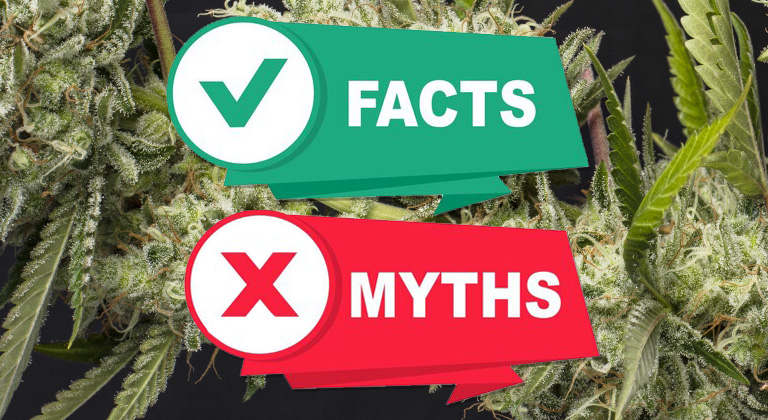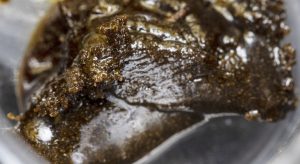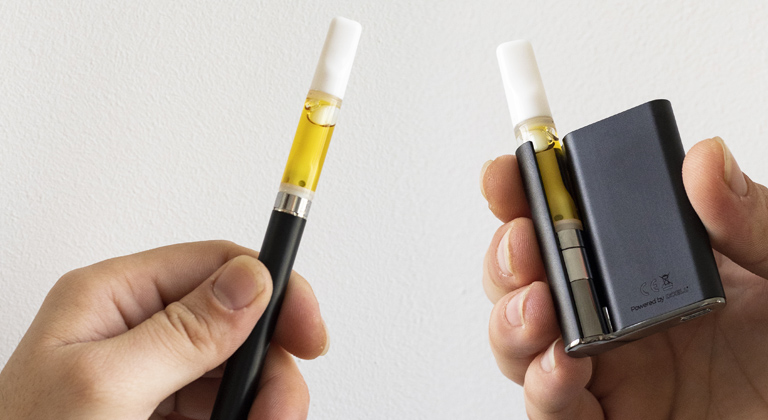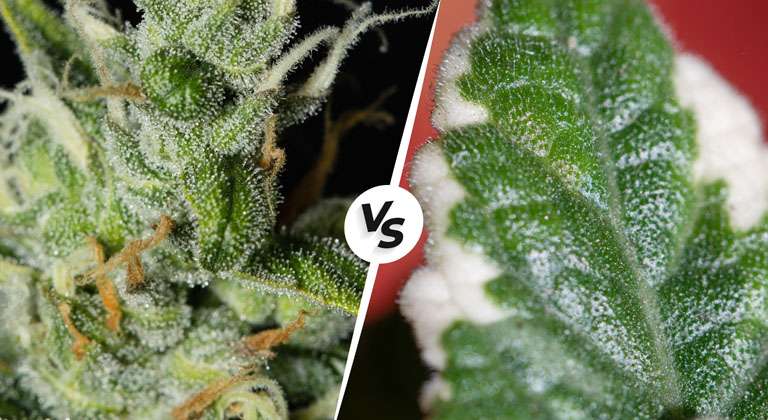Due to the longstanding illegality surrounding the cannabis plant, there are many rumors about its side effects that are not truly supported by science or medicine. Far from being a harmless substance, cannabis has both side effects and therapeutic properties; accurate and verified information, along with consumer education, is essential for preventing risks associated with its consumption.
In this article, we will examine some of the facts and fiction surrounding cannabis plants
Common Myths about Cannabis and the Brain
Let’s start with the most common myths about how cannabis affects the brain:
Myth 1: Cannabis kills brain cells
This idea has circulated for a long time, leading many people to warn against cannabis consumption in relation to “neuron loss.” However, scientific evidence suggests that this myth may not be based on reality.
Some studies claim that cannabis does not significantly kill brain cells. In fact, the human brain has a high concentration of endocannabinoid system receptors that interact with phytocannabinoids in more complex ways than previously known.
As a result, the use of cannabinoids, specifically CBD, for the treatment of various neurodegenerative diseases such as Parkinson’s or Alzheimer’s has been studied due to its neuroprotective ability.
A specific study often cited in discussions related to the lack of evidence of neuronal death due to moderate cannabis consumption is “Cannabis and the brain: a review.” This article reviews several studies and concludes that while chronic cannabis consumption may be associated with cognitive impairments, there is no solid evidence supporting neuronal death as a direct consequence of moderate cannabis consumption.
However, it’s important to note that results may vary depending on the type of cannabis, the amount consumed, the frequency and duration of use, as well as other individual factors.

Myth 2: Cannabis Causes Psychosis Automatically
Mental health is a crucial topic that requires users to have the most reliable information available to promote risk prevention.
In this regard, there has been much speculation about the relationship between cannabis consumption and the risk of psychosis. It’s important to understand that this is a complex issue that cannot be simplified with categorical statements, as various genetic and environmental factors come into play.
It’s believed that cannabis may trigger psychosis in individuals predisposed to this condition, but it’s not the sole cause. It seems that the quantity, potency of cannabis, and frequency of consumption play a significant role in this matter.
Relationship between psychosis and cannabis composition
Some scientific studies have explored the relationship between the cannabinoid composition of certain cannabis strains and psychosis. Two of the most studied compounds in this regard are THC and CBD, with the former being well-known for its psychoactive effects.
It has been suggested that abusive and prolonged consumption of cannabis with high levels of THC could increase the risk of psychosis, especially in individuals predisposed to psychotic disorders.
On the other hand, CBD, also present in the composition of cannabis, has demonstrated antipsychotic properties that can counteract some of the psychoactive effects of THC. Some studies suggest that cannabis strains with a higher ratio of CBD to THC, and even those containing only CBD (and less than 1% THC), may have a lower likelihood of triggering psychosis or even have therapeutic effects on individuals with psychotic disorders.
It’s important to highlight that the relationship between cannabis and psychosis is complex and multifactorial. Genetic, environmental, and lifestyle factors may also play a role in susceptibility to psychosis. Research on this topic is ongoing, and more evidence is needed to fully understand the relationship between cannabinoid composition and psychosis.
The Endocannabinoid System and its Relationship with Psychosis
In a recent study, researchers explored whether the endocannabinoid system in our bodies may be altered in people with psychosis. The results revealed that trial participants with psychotic disorders had higher levels of anandamide in their cerebrospinal fluid and blood, as well as increased expression of CB1 receptors in peripheral immune cells, compared to healthy individuals.
Additionally, the severity of psychotic symptoms was associated with changes in anandamide levels and the expression of CB1 and CB2 receptors.
Increased endocannabinoid system activity was observed in the early stages of the disease and in individuals not treated with antipsychotics, with a decrease in this activity after successful treatment. This mechanism appears to act as a natural regulation against psychosis, suggesting that successful treatments reduce the need for this “negative” feedback.
It can’t be conclusively established that cannabis consumption necessarily or immediately triggers a psychotic episode. What does seem evident is that the mechanisms involved in this disease are related to the endocannabinoid system, and further research in this direction is worthwhile.

Scientifically Proven Realities about the Effect of Cannabis on the Brain
Misinformation can spread like wildfire, clouding reality and projecting a distorted image of the plant to the user, while science serves to verify and debunk different issues. Let’s see what findings exist regarding the effects of cannabis on the brain.
Fact 1: Cannabis can have temporary cognitive side effects
Several scientific studies have investigated the temporary cognitive effects that may result from cannabis consumption. Evidence suggests that when a person is under the psychoactive effects of cannabis, short-term impairment could occur in various basic cognitive domains, including learning and memory, attentional control, and motor inhibition. What does this mean? Well, during the so-called “high” from cannabis, a person may have more difficulty learning, remembering what was learned under the effects, paying attention, and perhaps their motor skills would be somewhat clumsier. However, these effects would completely disappear once the effect has passed.
When it comes to the long-term and more permanent impairment of cognitive processes resulting from chronic cannabis consumption, researchers emphasize the need for further investigation into this matter. For now, several studies have glimpsed that chronic cannabis consumption can cause functional impairment in cognitive abilities in the long term, but the degree and duration of this impairment depend on factors such as the age of onset of consumption, the amount consumed, and the duration of consumption.
Additionally, several studies indicate that most consumers experience complete recovery of cognitive functions after a period of prolonged abstinence.
Fact 2: Cannabis can have benefits for certain brain diseases
It has been demonstrated that certain compounds in cannabis, particularly cannabidiol (CBD), can have benefits in the treatment of diseases such as epilepsy and chronic neuropathic pain. CBD is a non-psychoactive cannabinoid in cannabis that has shown anticonvulsant and analgesic properties.
However, more research is needed to fully understand its therapeutic potential and proper dosage.
Furthermore, in recent years, the scientific community has been focused on investigating the neuroprotective properties of CBD, aiming to determine if it could be useful in the treatment of certain diseases.
These studies have found significant evidence of the neuroprotective benefits of CBD:
- Effects on oxidative stress: A study published in the Journal of Neurochemistry examined the effect of CBD on oxidative stress using cultured cells. The results showed that CBD has a combination of neuroprotective, antioxidant, and anti-apoptotic effects (cell death prevention).
- Potential treatment for neurological diseases: CBD has been shown to have neuroprotective properties that could be effective in the treatment of diseases such as Alzheimer’s, Multiple Sclerosis, and Parkinson’s disease.
- Mental health benefits: Additionally, CBD has demonstrated anxiolytic and neuroprotective properties, which may be useful for individuals with mental disorders such as anxiety, depression, or post-traumatic stress disorder (PTSD).
- Analgesic and anti-inflammatory properties: In addition to its neuroprotective effects, CBD has also shown analgesic and anti-inflammatory properties. These studies suggest that CBD could be effective in the treatment of stress, anxiety, and sleep disorders.

Fact 3: Responsible Cannabis use is a Key Factor
As with any substance, responsible cannabis use is crucial. Avoiding excessive consumption and maintaining a balanced relationship with the plant is essential to minimize potential risks to mental health.
Furthermore, the age of onset and frequency of use are also key factors. Adult consumers who use cannabis occasionally and consciously tend to experience fewer adverse side-effects compared to those who abuse its use.
The impact of cannabis on the brain is a complex topic that continues to be studied by scientific and medical communities. While myths about the effects of cannabis on the brain have become popular, science offers a more nuanced perspective.
To reduce potential risks associated with the consumption of this plant, it’s important for the public to have access to accurate and verified information so that consumers can make responsible decisions regarding cannabis consumption, considering both risks and benefits.
Additionally, ongoing research is essential to better understand the effects of cannabis on the brain. We are convinced that the debate on cannabis will continue to evolve, as more scientific evidence accumulates regarding its impact on mental health.
What do you think of this post? Leave a comment below if you’d like more posts like this!
Cali Terpenes
Sources:
Cannabis Use and Risk of Psychosis: An Etiological Link – H Verdoux, M Tournier
Epidemiology and Psychiatric Sciences, 2004•cambridge.org
Cannabis use and the risk of developing a psychotic disorder (Arseneault et al., 2002)
Cannabis use and risk of psychotic or affective mental health outcomes: a systematic review (Moore et al., 2007)
Cannabidiol, a Cannabis sativa constituent, as an antipsychotic drug» (Zuardi et al., 2006)
Cannabidiol enhances anandamide signaling and alleviates psychotic symptoms of schizophrenia» (Leweke et al., 2012)
The effects of cannabis use on salience network connectivity, perceived stress, and illness symptoms (Filbey et al., 2014)
Cannabidiol reverses MK-801-induced disruption of prepulse inhibition in mice» (Long et al., 2006)
Adverse effects and expected effects of the cannabis consumption in dependent users – A. ROBERT SEGARRA, A. TORRES GIMÉNEZb, A. TEJERO POCIELLO, C. CAMPO LÓPEZ, J. PÉREZ DE LOS COBOS
The short-term and long-term effects of cannabis on cognition: recent advances in the field. E Kroon, L Kuhns, J Cousijn – Current Opinion in Psychology, 2021 – Elsevier
Cannabidiol in patients with treatment-resistant epilepsy: an open-label interventional trial. O Devinsky, E Marsh, D Friedman, E Thiele… – The Lancet … 2016 – thelancet.com
Cannabidiol modulates serotonergic transmission and reverses both allodynia and anxiety-like behavior in a model of neuropathic pain» (2019).D De Gregorio, RJ McLaughlin, L Posa, R Ochoa-Sanchez, J Enns, M Lopez-Canul… Pain, 2019•ncbi.nlm.nih.gov
Cannabidiolic acid methyl ester, a stable synthetic analogue of cannabidiolic acid, can produce 5‐HT1A receptor‐mediated suppression of nausea and anxiety in rats» (2018).
The Atypical Cannabinoid Abn-CBD Reduces Inflammation and Protects Liver, Pancreas, and Adipose Tissue in a Mouse Model of Prediabetes and Non-alcoholic Fatty Liver Disease» (2020)
Anticonvulsive Properties of Cannabidiol in a Model of Generalized Seizure Are Transient Receptor Potential Vanilloid 1 Dependent» (2020).











